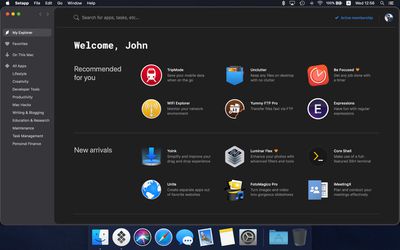Back in January 2017, MacPaw's subscription app service Setapp launched as an alternative to the Mac App Store, offering unlimited access to more than 60 Mac apps across a wide range of categories for a flat $9.99 monthly fee.

Since then, Setapp has grown its curated software collection to over 160 apps and gained 1 million users, and this week the service announced the public beta launch of Setapp for Teams, which offers the same raft of apps at a slightly reduced per-user pricing and single-point billing for a company or organization.
The pricing is pretty simple: For a team of four users, Setapp costs $8.99 per user per month. Each person can use Setapp on one device, and each additional device is $7.99 per month.
MacPaw says Setapp for Teams will remain in beta while it works to add features like single sign-on for admin management of app access, and user groups. Otherwise, the same apps that are available to Setapp's individual subscribers are accessible to teams.
Setapp's extensive catalog includes many popular apps in categories including productivity, design, writing, social media, and maintenance tools, all from approved vendors, and all apps on Setapp are available without ads or in-app purchases. Interested workgroups can try Setapp for Teams by following this link.



















Top Rated Comments
App Store: 2 million apps
article: "extensive" catalog
😂
with setapp, you may install and use *all* 160 apps for your one charge, as well as being entitled to *every* update, even the ones that are in the App Store under a new name and listing so that the devs can charge existing users again.
also, setapp’s library is curated, unlike Apple’s, which is filled with garbage.
here’s the thing: there was an app in the App Store that I very much wanted... actually bought... and it was about $60. I had been researching setapp, but didn’t realize that app was already in their library before I bought it from Apple. There were also several apps on setapp that I had previously purchased or was considering, so it was a no-brainer, really: for the price of this one app, I could have the whole library.
also, sub models, which suck as one-offs, are actually a really good deal when bundled. Better for the devs, too, as they get paid residuals based on app usage. This is why so many apps have moved to a model of “upgrade” listings or IAP subs in the App Store. The can’t survive on one-time purchases.
i mean, you DO realize that this is LITERALLY what Apple has done with Apple Arcade, right?
but, you do you...
I have already, further up in this thread, given my criticisms of SetApp but what you are saying here completely misses what they are offering.
The fact is that all software you buy becomes, in effect, a subscription if you continue to use it for years. Every popular app must be developed continuously, not only to deal with edge-case bugs unearthed by the activities of thousands of users, or to add features that keep them ahead of the competition, but also because operating systems keep evolving. The app you bought last year is not the same app today.
When you buy an app, you "own" the code as it stands at that point. Most developers will also include a period of updates, sometimes a year, sometimes until the next major version. If you want to upgrade to the major next version, you may get a discount but the principal that you have to pay again has been well-established: you do not have to upgrade to the next major version but, if you do, it is fair that you share a tiny part of the ongoing development cost.
Saying that there are Open Source or free versions of all these apps is delusional. I am an Open Source advocate but even I understand that these are not the type of app that will attract sufficiently skilled volunteers or the type of sustained, longterm effort required.
What you are really saying, by bothering to complain on a thread about a paid software product, is that you think you should be given the work of these developers for free because, to you, they are not worth 99 cents. Trust me when I say that you are the epitome of the type of customer who software developers do not want, the miserable guy who never sees value in the talent or hard work of other human beings.
You might argue that when they pay $5 a month they get access to updates that they wouldn't have gotten by paying $60 upfront. This is where the risk comes in. Subscriptions ask the end user to pay more to have access to features that might have value for them if they are ever released. If they don't come out, or the new features don't have value, than all they did is pay more. Maintenance updates do not add value and their cost to the developer should have been factored into the original price.
I am not saying anyone deserves software for free, but the reality is that some software is free, and paid app developers are competing in a market where they exist. If app developers feel they need to charge a reoccurring price to maintain income should be prepared to defend why they charging that cost and not simply increasing the initial price. Unstable pricing of third party data and server costs can just as easily be offset by allowing users the ability to select their own data input locations, supporting multiple data profiles, or allowing users to choose their own hosting options.
Software subscriptions are a marketing concept designed to manipulate the cost-value relationship. To endusers it seems cheaper upfront but they end up spending more in the long run, and getting less back since developers have less pressure to release killer new features. Subscription bundles are worse in that they use volume to obscure the cost-value relationship even more. Gamers know this all to well. Sure, this Steam sale offers 20 games for $1, but considering the average person might only play 25% of four of them the value is hidden behind this idea that they had access to hundreds of hours of gameplay.